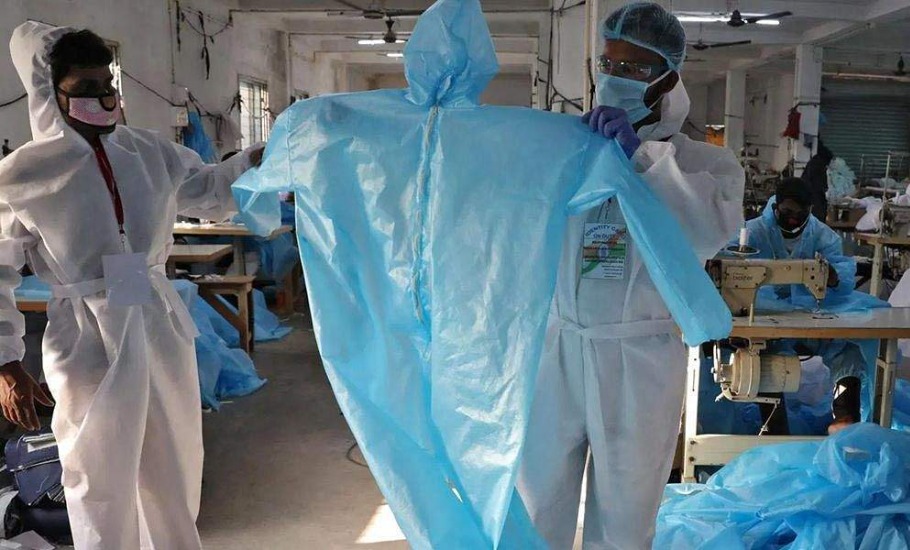
Behind PPE supply: Irregularities, anomalies and alleged scams
Several incidents of alleged irregularities in the procurement, besides scarcity, of personal protective equipment have surfaced in the past few months during the country’s battle against the deadly COVID-19 pandemic.

Skeletons are tumbling out from a cupboard meant to provide protection to frontline coronavirus warriors. When doctors, nurses, healthcare and sanitation workers have been complaining of shortage of personal protective equipment (PPE), several incidents of alleged irregularities in the procurement of the protective gear have surfaced in the past few weeks.
One of the major alleged scams came to the fore last month in Himachal Pradesh after a top official was heard in an audio clip asking for bribe for the purchase of PPE kits. Accused Dr Ajay Kumar Gupta, director of state health services, was arrested and suspended from services, though he was given bail.
After a probe was ordered into the alleged corruption case, the state BJP chief Rajeev Bindal resigned from his post “on high moral grounds”.
Himachal Pradesh is not the only state to report alleged irregularities in this matter. Incidents of unavailability of PPEs and alleged irregularities in the procurement process have been reported from several places across India.
Related news: Doctors, the soldiers in the war against COVID-19
Tamil Nadu
In the initial days of the outbreak, frontline workers in Tamil Nadu had faced a scarcity of masks and PPEs and many medical students alleged that they were not given the protective equipment, making it risky for them to work in coronavirus wards.
Medical students had even written to the government and the media through their deans in this regard. Later, the Tamil Nadu Medical Services Commission said it had ordered the PPE kits. However, it took a much longer time to arrive.
What further delayed the procurement process was the Centre’s direction that states shouldn’t order medical equipment on their own.
In mid-April, local MPs in the state criticised the Centre for suspending the Local Area Development (MPLAD) funds for two years. Many alleged that they, along with the district administrations in their respective constituencies, could have arranged PPEs on their own if they had the funds.
Amid this mess, several doctors in the state had arranged PPEs on their own and many in government hospitals were largely dependent on NGOs and other industries who, in their CSR capacity, donated masks, sanitisers and protective overalls.
Related news: Taken for granted, nurses are overworked and underpaid
Strangely, S Nagarajan, the project director of the Tamil Nadu Health System, was transferred for allegedly turning down medical equipment that were sold to the government at a higher price.
“It is true that in the initials weeks we faced a shortage of PPEs. But now, things have settled,” said a government doctor.
Karnataka
In Karnataka, there were allegations of money swindling during procurement of medical equipment.
CN Deepak, an activist and member of the Karnataka Rashtra Samithi, a new political party, had alleged that the Karnataka Drugs Logistics and Warehouse Society, involved in the procurement of medicines, ventilators, and PPEs, swindled public money and that the equipment were procured at higher prices.
Following complaints of irregularities in the procurement process of ventilators and PPEs, the Public Accounts Committee (PAC) of the state legislature sought a report from the state health department. Headed by Congress leader HK Patil, the PAC was to order a probe into the alleged irregularities.
Related news: States cry foul as Centre consolidates power on buying COVID-19 equipment
However, Assembly Speaker Vishweshwar Hegde Kageri stalled the probe by issuing an order on May 27, and barred the committee from conducting field visits or meeting officials. He also noted that the PAC acted on the matter without bringing it to the notice of the Speaker.
Speaking to reporters on May 30, Patil had alleged that the Speaker was trying to stifle the independence of a statutory institution, and said that there was no freedom to even investigate irregularities in the state.
Irked by the Speaker’s response, Congress members alleged that his action amounted to promoting corruption. The Congress has demanded a white paper on the issue, and the PAC is now mulling to move a privilege motion against the Speaker.
West Bengal
There have been complaints of anomalies in the distribution of PPEs in West Bengal too, with many frontline health workers having alleged that they did not receive any protective gear.
To address this issue, the health department, vide an order dated May 9, had set up a dedicated helpline (1800-120-444-222) for “ventilation of issues regarding the non-availability or insufficiency or non-supply of PPE and supplies.”
Related news: UP hospitals allege state agencies supplying ‘substandard’ PPE kits
The West Bengal government had placed an order for 1.65 million PPEs, out of which it received around one million protective suits. It had also ordered around 3.25 million masks, and received over 3 million.
The procurement is generally done through the West Bengal Medical Services Corporation (WBMSC), but to fast-track procurement process, a six-member committee led by the health secretary is now making the purchases.
In Uttar Pradesh, a state-run enterprise had come under fire for supplying PPEs of inferior quality to government hospitals. The hospitals attached to the Government Institute of Medical Sciences (GIMS) and Meerut Medical College had refused to use the “substandard” kits supplied by the Uttar Pradesh Medical Supply Corporation Limited.
Following complaints by the GIMS Director and the Principal of the Meerut Medical College, the managing director of the Medical Education Department, K.K. Gupta, had written to eight major hospitals and medical institutes in the state, asking them not to use the kits.
(With inputs from N Vinoth Kumar, Samir K Purkayastha and Prabhu Mallikarjunan)


